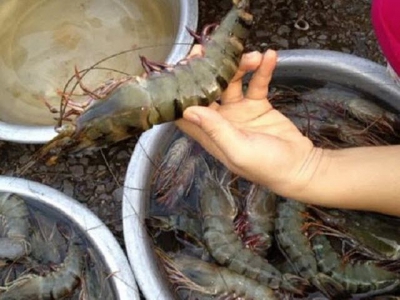Cà Maus organic shrimp – solution to climate change adaptation

Despite being one of five provinces that are terribly suffering from climate change and one of three provinces that are vulnerable to the sea level rise, Cà Mau’s shrimp sector has been developing as the key factor of the provincial economy. Of all practices, the organic shrimp farm is considered a sustainable model and helps local farmers have steady income and adapt the climate change.
Cà Mau has now more than 80,000 mangrove forests with 30,000 hectares of mangrove-shrimp farm, 14,000hectaresof which is certified for organic shrimp farming and it is extended. The average production of cultivated shrimp from mangrove-shrimp farms reach 300-350 kg/ha/year and the selling price is 15-20% higher than others.
Beside this, over more than 40,000 hectares of shrimp-rice farm, the provincial authority is proceeding to certify the organic shrimp in 400 hectares. The shrimp-rice rotation is a sustainable practice and brings high economic efficiency with production of 350-400 kg/ha/year, which is 15-20% higher than the extensive shrimp model.Cà Mau has 50,000 hectares for farming shrimp in combination with other species such as crab, fish, and blood cockle.
As for organic shrimp, farmers carry out the pond remediation and stock the shrimps at density where the shrimp are fed by natural feed, weigh up well for high quality and food safety assurance, and satisfy the requirements of difficult markets such as the EU, US and Japan. The high strength of Cà Mau organic shrimp has increased their global competitiveness.
Cà Mau plans to get around 30,000 hectares of certified organic shrimp farms, 20,000 hectares of which will be mangrove-shrimp farms, 5,000 hectares will be organic shrimp ones and around 5,000 hectares will be combination practices.
Related news
 Microplastics found in a majority Oregon-harvested shellfish, study finds
Microplastics found in a majority Oregon-harvested shellfish, study finds A Portland State University study has shown that microplastics –tiny fragments of plastic less than five millimeters in length – have been found in the vast
 5 Approaches to Making Aquaculture Sustainable
5 Approaches to Making Aquaculture Sustainable There is a huge demand for seafood around the world. Seafood makes up one sixth of all animal based proteins consumed around the world.
 Gov’t seeks sustainable growth in seafood sector
Gov’t seeks sustainable growth in seafood sector The Government will focus on restructuring the seafood industry based on the demands of local and global markets to obtain sustainable growth